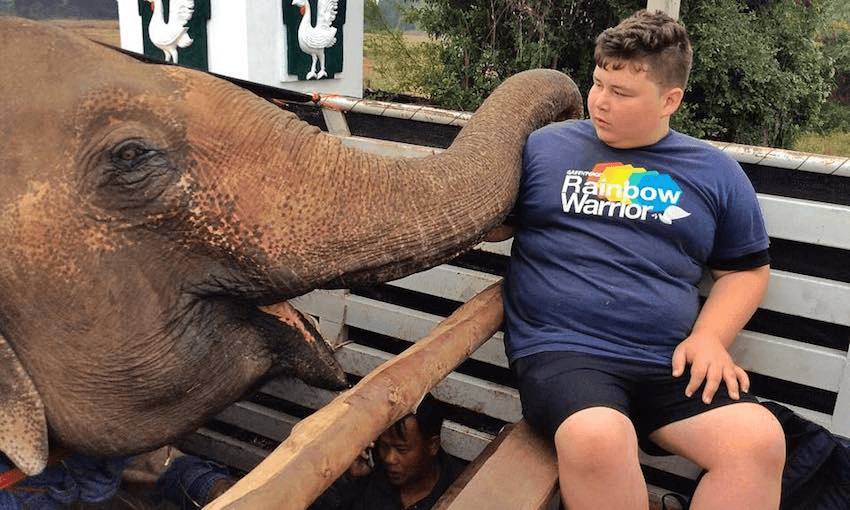In the second story in a series celebrating the amazing things young New Zealanders do every day, meet Jack Lanting, a Kiwi teen whose heart is as big as the Thai elephants he has dedicated his life to protecting.
Lily the Thai elephant had been force fed methamphetamine for years by her handler. When Jack Lanting, a big-hearted Waikato teen, met Lily, now safe in the Elephant Nature Park, it was love at first sight. Eight years later, having spent much of his life supporting elephants in Thailand, he wants to open his own elephant sanctuary. Jack, 16, says his reasons are simple: ”I want more than anything to give elephants a life worth living”.
Jack was only eight years old when he first went to Thailand on a family holiday and became concerned about elephants he saw .
”I had wanted to ride an elephant, see them play soccer and paint pictures, but I was upset to learn what they went through to have tourists on their backs and do silly tricks. I decided that I would rather see them free from saddles and being like an elephant should be,” Jack says.
It was on this trip that he met Lily.
”From the moment I met her and the entire time I was there she wanted to be with me and I loved being with her. We spent all our time together,” Jack says.
Jack decided he wanted to provide a better life for another elephant, a life like the one Lily had come to enjoy. In a remarkable effort, he raised $20,000 and in November 2010 he returned to Thailand with his mum Viv and bought a broken-down former trekking and logging elephant, aged in her 70s. Jack named his elephant Kwan Jai, Thai for “beloved”.
Jack donated her to the Elephant Nature Park in Chiang Mai, a rescue and rehabilitation centre founded in 1996 by Thai woman Lek Chailert, and he was there again in 2013 when Kwan Jai died.
Since then Jack has returned to Thailand many times with his mother, and is in the final stages of planning and fundraising for his own elephant sanctuary to be built in the country he has come to know so well and love so much.
”I’ve taken every opportunity to learn all I can about elephants and working with them. I still have a lot to learn though,” Jack says. ”There is nothing else I have ever wanted to do and the elephants need help. They need me.”
Jack says he takes inspiration from environmentalist and adventurer Robert Swan, who said: “There is no greater threat to the planet than people believing someone else will fix things”.
”It’s true,” says Jack, ”and I am not prepared to wait for someone else to do something when I know I can do it myself. I want more than anything to give elephants a life worth living. They deserve to be able to find their natural character, it’s that simple really.”
Jack says he has never imagined a life where he is not working with elephants.
”There has been some hard times but I’ve never given up and I know that I will not stop helping them because I have seen too much and I will never let them down,” he says. “When I’m working with elephants I feel like I belong.”
Jack’s planned sanctuary will focus on helping both captive elephants in the tourist industry and wild elephants.
”Both need help,” he says.”The project will be a hands off experience for visitors who will be able to enjoy watching elephants being themselves which is the best entertainment they can give. There is no point in saving the elephants if there is no jungle and local people need to be on board for conservation to truly work.”
The project will combine reforestation efforts, human and wild elephant conflict abatement measures that include beehive fencing (that also creates added income) around local farmers crops, creating a co-op with farmers that helps to raise their income and to see the elephants as a benefit to them rather than a pest.
The project will also be an education project with programmes dedicated to school groups that includes sponsoring Thai children to attend for free. ”They are the ones who will be able to make the biggest difference in the future for their own country,” says Jack.
”I want the project to be as eco-friendly as possible by generating electricity from a river and the sun, running all our vehicles on bio-diesel and growing most of our food. We will show locals how permaculture can help them to grow their crops without pesticides faster and better quality. Being organic, these crops will sell for a lot more money, and by choosing crops that elephants don’t like such as coffee and cacao that grow under the trees, they will not need to cut the trees down.
”If a wild elephant does wander into their crops and destroys it, we will support the farmer and his family by allowing them to take food from our gardens and some extra to go and sell at a market until they are back on their feet.”
Jack says he wants to employ entire families to keep them together. ”I have seen a lot of Thai families living apart and not able to be with each other for months.”
Jack says he has always loved elephants since he first me Lily when he was just a small boy in Thailand. ”Maybe I relate to them,” he says.
”I love their sense of humour but I also feel so sad for them. They are so big and strong and even though knowing what they have been through, most are still gentle to humans, forgiving and don’t hold grudges even though they have every right to.”
To find out more about Jack’s work or to make a donation visit kwanjaielephantfoundation.com
Previously in Amazing Kids: You’re never too young to save the planet


